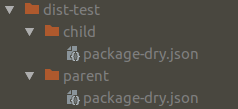dry-dry v0.4.0
DRY - Use npm across multiple projects without repeating yourself
Get it
$ npm i -g dry-dryUse it
$ dry initThe copy/paste madness
Because companies and other groups have bunch of package.json attributes that are the same across all npm projects.
Those attributes must be maintained using copy/paste across all projects.
This is wrong !
We believe that those attributes should be easily distributed and updated across projects.
The version management madness
Because most of multi module project use multiple version of the same dependencies. Bundling an application with those modules may be challenging.
Dry provide a mecanism to centralize dependencies version management.
Do not repeat yourself
dry is a stupid npm wrapper allowing any package.json to extend a parent file.
The parent file can be located on the system or simply inside a published npm module.
How does it work
On each dry command, dry:
- creates a merged
package.jsonbased on the providedpackage-dry.json - runs the
npmcommand - applies the possible
package.jsonmodifications made bynpmtopackage-dry.json - removes
package.json
package.json is always removed to make sure that nobody will execute a pure npm command in a dry project.
Inheritance in action

Parent project
package-dry.json
{
"name": "parent",
"version": "1.0.0",
"description": "",
"main": "index.js",
"scripts": {
"test": "echo \"Error: no test specified\" && exit 1",
"foo": "npm help"
},
"keywords": [],
"author": "",
"license": "ISC",
"dependencyManagement": {
"dependency-one": "1.0.0",
"dependency-two": "2.0.0",
"dev-dependency-one": "1.1.0",
"dev-dependency-two": "2.2.0"
}
}Child project
package-dry.json
{
"name": "child",
"version": "1.0.0",
"description": "",
"main": "index.js",
"scripts": {
"test": "echo \"Error: no test specified\" && exit 1"
},
"keywords": [],
"author": "",
"license": "ISC",
"dry": {
"extends": "parent/package-dry.json",
"dependencies": {
"parent": "1.0.0"
}
},
"dependencies": {
"dependency-one": "managed",
"dependency-three": "1.2.3"
},
"devDependencies": {
"dev-dependency-two": "managed",
"dev-dependency-three": "1.2.3"
}
}Merged package.json
{
"name": "child",
"version": "1.0.0",
"description": "",
"main": "index.js",
"scripts": {
"test": "echo \"Error: no test specified\" && exit 1",
"foo": "npm help"
},
"keywords": [],
"author": "",
"license": "ISC",
"dependencies": {
"dependency-one": "1.0.0",
"dependency-three": "1.2.3"
},
"devDependencies": {
"dev-dependency-two": "1.1.0",
"dev-dependency-three": "1.2.3"
}
}package-dry.json
To do that, dry introduces a file named package-dry.json.
package-dry.json replaces package.json in your dry projects.
Of course, it can contain all the attributes of package.json with the addition of an attribute called dry.
package-dry.json dry attribute has 2 optional attributes:
extends- The parent of the current dry packagedependencies- The dependencies needed to resolve the file pointed byextends. Those dependencies will not be saved to your project.
dry commands
dry proxies all received arguments to npm.
Just take your usual npm commands and replace the word npm with dry.
| npm | dry |
|---|---|
| npm init | dry init |
| npm i | dry i |
| npm install | dry install |
| npm publish | dry publish |
| npm x y z | dry x y z |
dry commands : additional parameters
The dry command accepts some additional parameters
--dry-keep-package-json' : when provided the generated package.json file is not deleted
--dry-save-package-json-to' target_file_path : when provided a copy of the generated package.json file is done to target_file_path location
